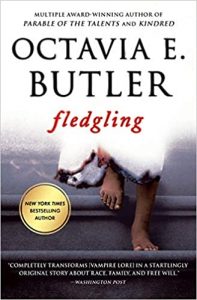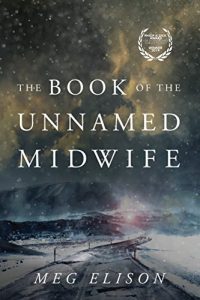Content Warning: This review contains spoilers, but only specifics about the world, nothing plot-specific past the first chapter. I knew almost nothing about this book when I started reading it, and it was such a pleasure to be surprised, so if you like vampire stories, or Octavia Butler, I highly recommend it and you can stop reading this review now and just go pick up the book.
The opening of Fledgling by Octavia Butler is an intense sensory overload, where the nameless narrator is, too, on sensory overload, starving and being burned alive by the sun’s rays. She finds some meat to eat, and it proceeds to be one of the most sensual scenes I have ever read (and I have read a lot of erotic literature).
I didn’t know a lot about the story as I read it, and I don’t want to spoil anyone else’s experience of the meticulous, expertly woven unfolding that Butler does in the first few chapters, building a new world and explaining to us readers, slowly, what it is to inhabit this world. The nice thing is, the main character and narrator, Shuri, has completely lost her memory, and though she previously had a place in the world, has to re-learn everything she knows about how her tribes communicate, the social politics, and how things manifest. She slowly re-learns what her brain injury took from her, and in the process, builds her life from scratch.
Did I mention Shuri is a vampire?
Did I mention Shuri is Black, but the vast majority of vampires in this book are white, and Shuri is the result of a genetic experiment to encourage vampires to be able to withstand sunlight (which she can)?
True to form, Butler uses this particular trope of the vampire to discuss and investigate race relations, among other things, like sexism, classism, homophobia, and ageism.
As a person in kink and D/s relationships, I particularly loved how Butler depicted the symbiotic relationship between vampires and humans. It’s slightly different than in other vampire lore, but, as a fan of the genre in general, I found it believable and exciting. I loved how there was both a choice and a physiological component that bound them to each other, with a point of no return after a certain amount of contact.
Fledgling is the last novel Octavia Butler wrote and published, and I have read critiques and assessments that said it was clear Butler had created an entire world, and that Fledgling was just the tip of the iceberg in that world. I felt fairly satisfied with it as its own story, after I read it, knowing that there weren’t any others in the series, but the idea that Butler had a trajectory of the story already in her mind, but that is now lost and I will probably never read, does feel incredibly sad for me. I will only have to imagine into the future of Shuri’s world for myself.


